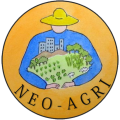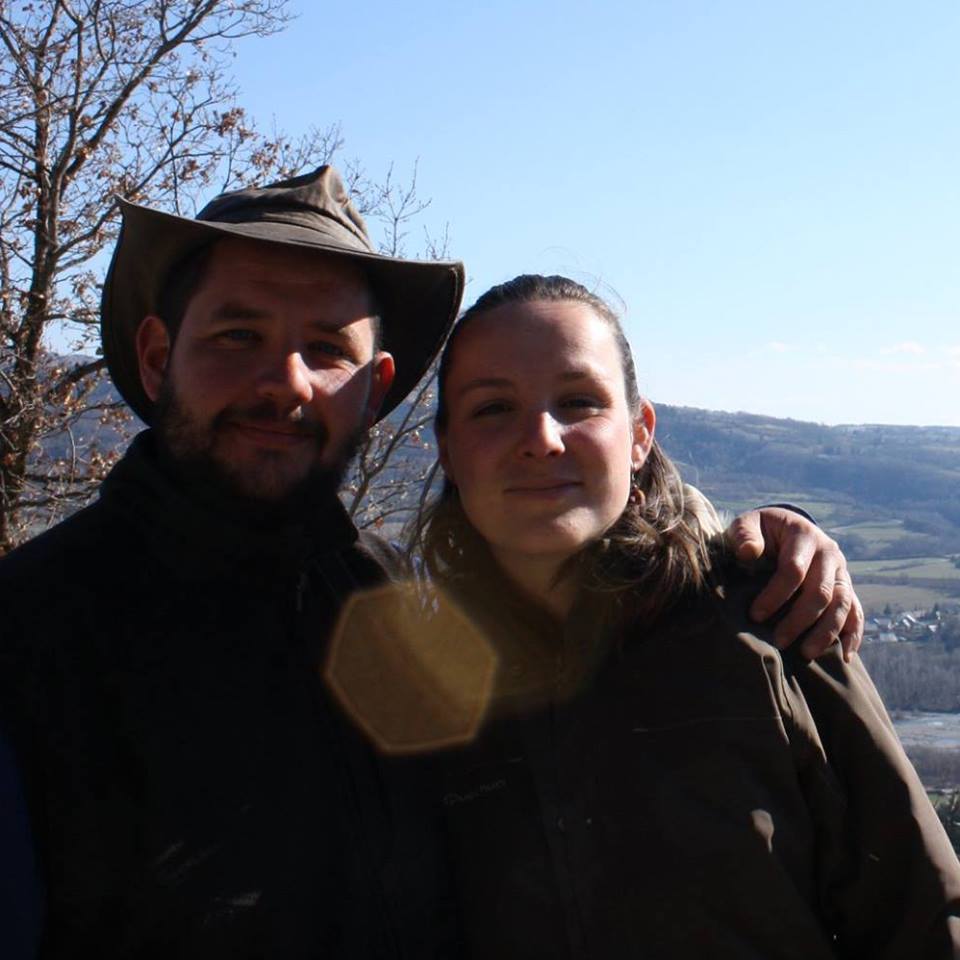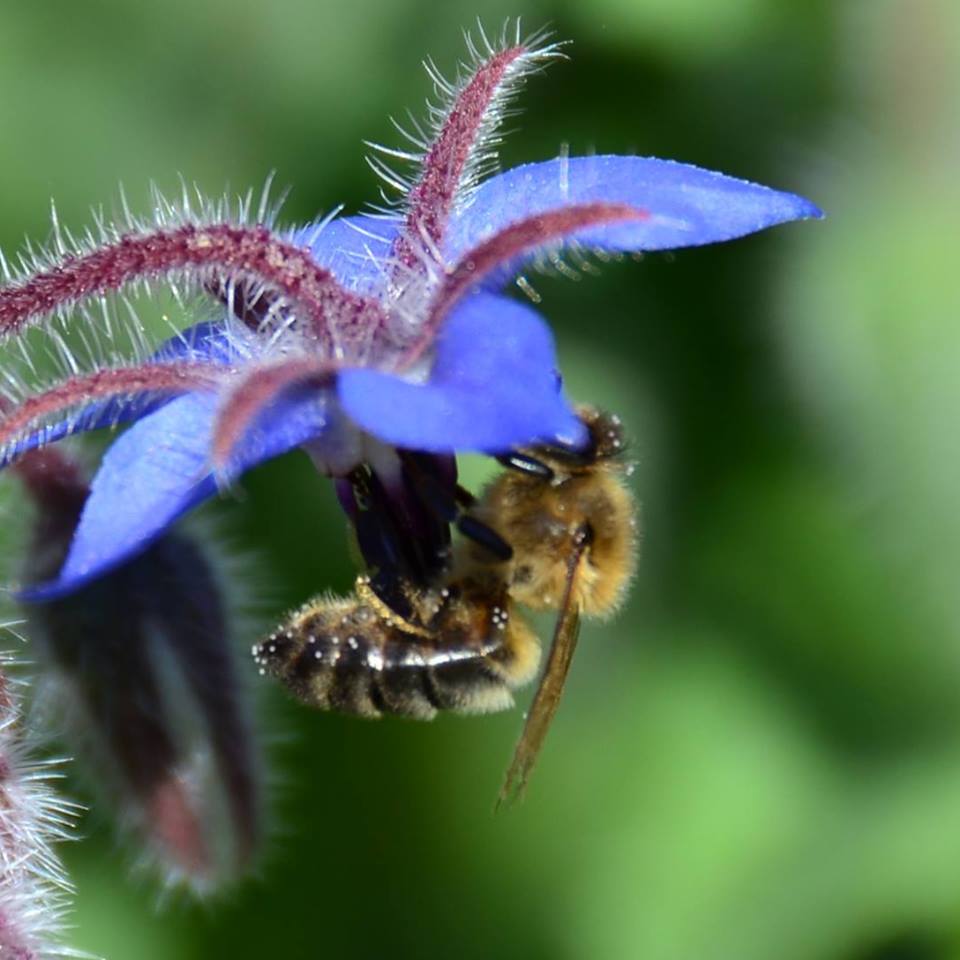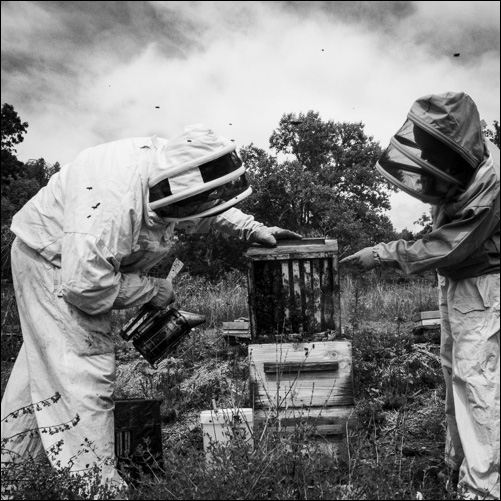Clémentine is now a young beekeeper in the Hautes Alpes in France. She has worked for four years alongside her husband Jonathan on their farm “Le rucher des Noisetiers”, 1200 m high.
“I did not want at all to become a beekeeper”
Daughter and granddaughter of beekeepers, Clémentine grew up in hives. She almost doesn’t see her father; he works a lot and is on the road from April to July / August for the transhumance of bees. This is partly the reason why she doesn’t want to become a beekeeper and she says loud and clear: “I will never marry a beekeeper! “.
She studies geography and more specifically aerial mapping. Like a modern day Saint Exupéry, she flies over (as co-pilot) the countries to map them. She also spends a lot of time in the office to prepare flight plans of areas to study. She is passionate about this profession but the fate strikes at the door. One day, she decides to quit to start a new project with Jonathan, son of a beekeeper who she fell in love with before beginning her studies.
They fall for a house, in the town of Chabottes, with land in the mountains but need the 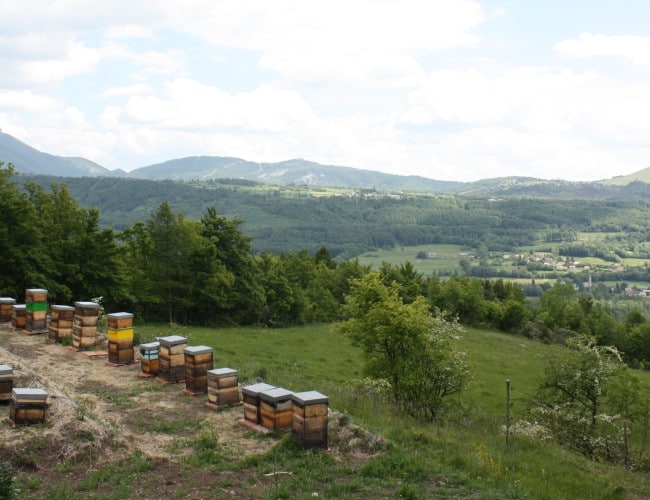 official farmer status in order to acquire it. He is passionate about bees and already takes care of 80 hives. “I knew a little about bees but it had never interested me. My husband introduced me to the bees; it’s exciting to see how they evolve week after week. You can work outside in the nature, I think that’s what I needed: a noble profession, an ancient knowledge.” Let’s leap, they will become beekeepers! But to become professional, they need a minimum of 200 hives! Let’s start working seriously: become farmers and buy 120 additional beehives!
official farmer status in order to acquire it. He is passionate about bees and already takes care of 80 hives. “I knew a little about bees but it had never interested me. My husband introduced me to the bees; it’s exciting to see how they evolve week after week. You can work outside in the nature, I think that’s what I needed: a noble profession, an ancient knowledge.” Let’s leap, they will become beekeepers! But to become professional, they need a minimum of 200 hives! Let’s start working seriously: become farmers and buy 120 additional beehives!
They do their research and decide to ask for the state subvention for Young Farmers. For this, they need an agricultural degree. Fortunately, Jonathan already has a BPREA (Professional Diploma of Agricultural Operations Manager), unlike Clémentine, and can simply make a 21h internship and follow some courses to get the status. They must also elaborate a Farm Development Plan proving that they will be viable after 5 years. After 3-4 months of efforts and numerous exchanges with the Chamber of Agriculture, they finally obtain the precious title, Jonathan officially becomes a farmer and Clémentine gets the status of “farmer spouse collaborator” that gives her access to insurance and retirement. Luckily the owners of their dream house accepted to wait for them and a bank finally agrees to give them a loan!
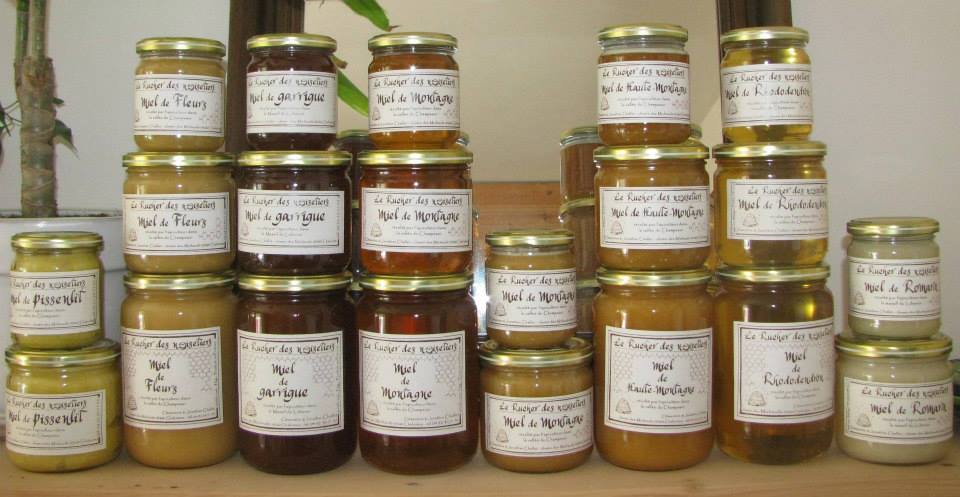 Despite the valuable assets they have, they already have experience and their parents are beekeepers and can help them and lend them equipment, their beginnings are difficult. This is not an easy job every day, the colonies are suffering, they are hit by the crisis of beekeeping. In the first year, a big drought, and then the year after a heavy rain in spring, a disaster. The production has declined for three years and they are struggling to repay their loan. Clémentine realizes they mistreat the bees by moving them and removing their honey; they try to take care of the bees at best but they must still ensure to remain viable to maintain their family. “I am outraged by the fact that on the one hand pesticides are allowed and on the other hand we are trying to save the bees! “
Despite the valuable assets they have, they already have experience and their parents are beekeepers and can help them and lend them equipment, their beginnings are difficult. This is not an easy job every day, the colonies are suffering, they are hit by the crisis of beekeeping. In the first year, a big drought, and then the year after a heavy rain in spring, a disaster. The production has declined for three years and they are struggling to repay their loan. Clémentine realizes they mistreat the bees by moving them and removing their honey; they try to take care of the bees at best but they must still ensure to remain viable to maintain their family. “I am outraged by the fact that on the one hand pesticides are allowed and on the other hand we are trying to save the bees! “
The choice of permaculture
Investigating on the internet to discover techniques to save their bees, Clémentine and Jonathan discover permaculture:
“The permaculture principles are in accordance with our way of life, we are in the nature, we love to eat what we grow, to buy as few gadgets as possible, live with sobriety adapting ourselves to our environment etc…it immediately made sense to us.” Little by little they change their working methods while reading many books, renovate their farm and build a honey house with second hand materials. They abandon conventional beekeeping and transhumance trying to develop a new model more respectful of bees. “When you are among traditional beekeepers they teach you to do the transhumance but we had a blast, we were tired of not having any honey. We are convinced transhumance kills our bees, it weakens and puts them under stress. From now on we will stay in our valley and the bees will be able to have a real break in winter.” Another advantage of working near home is to easily surveil their hives, unfortunately with the crises robberies are frequent.
Technically speaking, they changed their Dadant hives (it’s the name of the inventor) for Warré ones which are closest to the bees’ natural habitat (smaller so easier to heat…). Moreover, this design needs less human intervention on the colony. They raise a local race of bees and try to diminish the use of the smoker and do it with lavender straw that’s less aggressive: “A hive works mainly with odors (also with vibrations, heat…), the colony has a specific odor, larvae liberate pheromones that indicate what they need to eat; we must stun them with the smoke, I’m sure it generates even more stress, they have to put everything has it was after our intervention.” Clémentine and Jonathan progress and bring improvements to their farm week after week and each time get closer to a model consistent with their beliefs and moral values.
A turning point, let’s grow a farm of the future!
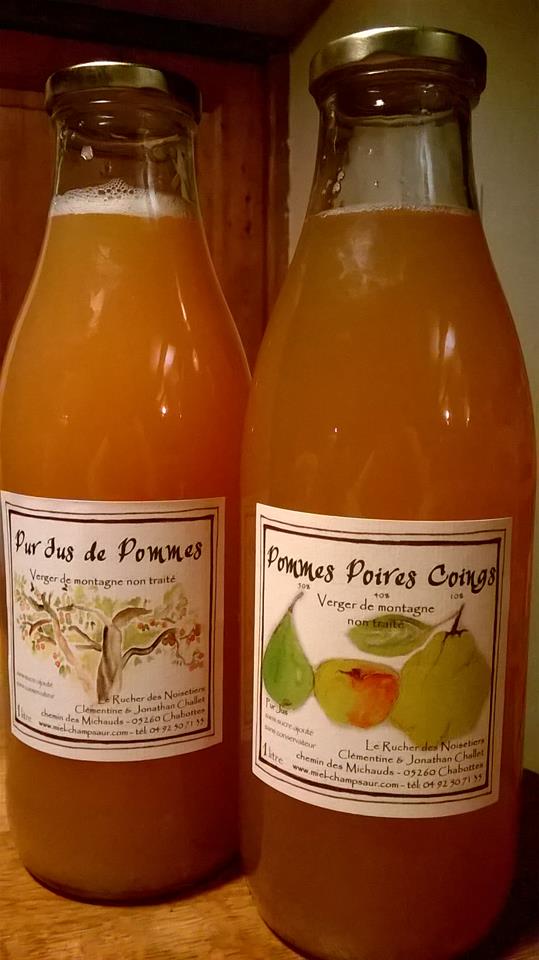
In May 2015, full of hope and with many ideas, Clémentine and Jonathan apply to the contest Fermes d’Avenir (Farms of the Future – organized by the association Fermes d’Avenir and the startup la Ruche qui dit oui) which aim was to reward and coach 13 innovative farms in France. They won the contest in June! They are today transforming everything, the financial price they obtained will allow them to build a bioclimatic greenhouse to develop a horticultural activity in complement to beekeeping and of hen raising de they started recently. This diversification will allow them to maintain 200 hives, in order to have some which produce and others to renew the colonies, instead of the 400 that were intended in their Farm Development Plan, to reach the economical equilibrium.
Clémentine and Jonathan will build a farm of the future, a multifunctional farm, agroecological, open to visitors for environmental sensitization and ecotourism! “People are always fascinated when we show them the hives and explain them how they work; such a complex insect that creates such a beautiful and good product, it’s captivating!”
Project detailed description in french : https://bluebees.fr/fr/project/196-paca
Facebook: https://www.facebook.com/lerucherdesnoisetiers/timeline
Clémentine piece of advice
“You have to start little by little at the beginning, do not buy 200 hives right away. It’s too hard to maintain, we still have 200 000 euros to repay to the bank.”
“Begin having two activities, do not become a farmer right away. Do not start with preconceived ideas and surround yourself with good contacts.”
“I advise to diversify your activity. Grow some vegetables, raise bees for pollination, hens, a little of everything allows the whole to be coordinated and complementary. Those who have a thousand hives do not achieve to manage them without using syrup. Many of these beekeepers abandon their activity. They aren’t able to look at all the hives every day. What we need is more small farms taking care of each hive than industrial apiculture.”
“You must collaborate with the bees instead of exploiting them. Nature gives us what it wants.”
“Being a peasant implies a lot of work and investments. You have to be involved in your project but do not forget to take time for you, holidays. We have obliged ourselves not to work on Sundays; we have children and we want to see them grow up.”
